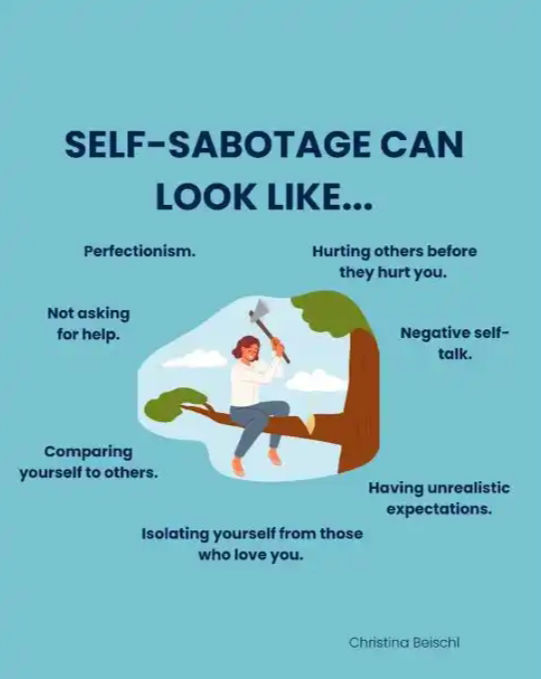Unlearning Self-Sabotage: The Subtle Ways You've Been Limiting Yourself
- primaraldinternshi
- Aug 1, 2025
- 4 min read
I used to think self-sabotage was the big dramatic stuffs like not adhering to the Doctor's prescription, suddenly quitting jobs, ruining relationships, self-harming or even blowing up success out of fear. But really, sometimes self-sabotage is quiet. Subtle. So sneakily stealthy that you don't even recognize it as sabotage.... until you are stuck, drained or wondering why things aren't working out.

A good number of us self-sabotage, myself included. Sometimes we do it consciously, but the winning number is that we often do it unconsciously. You know those moments when you say "I will do it later" otherwise known as procrastination, overthinking, suppressing our feelings or even some of our coping mechanism et cetera. Yes, they all sound harmless but these are self-sabotaging behaviors — subtle signs of self-sabotage that might just be holding you back.
In this post, I have compiled those small but powerful ways you and I are holding ourselves back, blocking our success and how we can unlearn them, one uncomfortable truth at a time.
Meaning of Self-Sabotage

Self-Sabotage is when you intentionally or unintentionally act in ways that block and stunt your progress, success or well-being. It’s like putting obstacles in your own path—often without realizing you're doing it.
Self-Sabotage happens when our actions, thoughts and behaviors work against our goals.
If you have reflected on your habits after these paragraphs, then you have taken the first step on how to overcome self-sabotage because I believe if you've realized those behaviors that are self-destructive, then you would want to do something about it.
Now let's deal with our most subtle habits of self-sabotage.
Self-Destructive Behaviors
Procrastinating only on the important stuff

Yes we all know procrastination —lazying around and avoiding to do what we need to do and setting it up for later date and time. This is the typical knowledge of procrastination.
But there are times when we feel productive all day, ticking off small tasks—while completely avoiding the one thing that could actually move us forward. This is procrastinating on the big stuff. I learned that sometimes, procrastination isn’t laziness. It’s fear in disguise. So, what do we do about this
Tip: We will ask ourselves, “What’s the ONE thing I’m avoiding today?” That’s usually where the growth lies. And we will handle that task, check it off the to-do-list
Overthinking Every Decision

Am told I overthink because am a libra. What about you? I thought over thinking was me being “careful” and “strategic.” In reality, I was overthinking myself into paralysis. I’d spend days deciding on things that didn’t need that much energy. Spoiler: Nothing gets done when you're stuck in your head.
For those of us in this boat, here is a trick have learnt
Tip: I give myself a 24-hour window for non-critical decisions. Because sometimes done is better than perfect.
Not Celebrating Small Wins

Some of us keep moving the goalpost. No matter what we have achieved, we tell ourselves, “It’s not enough yet.” The goal for yesterday seemed like the ultimate but once it's realized, the goal for today feel like the greatest and then the one for tomorrow and the day after... That constant chase makes us feel like we are failing—even when we are doing so well. That’s emotional sabotage.
Tip: We will start writing down weekly wins, even the tiny ones. Progress is still progress and we need to flatter and gain some sense of fulfillment every now and then. Drown yourself in confetti, dance your win dance, bump fist or high your colleague
Saying Yes When You Wanted to Say No

Whether it's the fear of disappointing others or being seen as “difficult,” some of us find ourselves constantly agreeing to things that drain us. Then we wonder why we are resentful or exhausted. Here is what we will start doing
Tip: If it’s not a genuine “yes,” then it’s a big capital “NO”. Boundaries are self-respect in action
Waiting for Motivation Instead of Building Habits

Some of us wait for inspiration to strike before starting projects. We wait for that big INSPO, that well-structured, revelational line or two that triggers and boost our energy level. The truth? It rarely happens. What we need isn't more motivation—its discipline and structure.
Tip: We will stop relying on how we feel and start following routines, even on “blah” days. Motivation or not, we start, we push and keep thriving.
Self-Criticism

For some of us, self-critique is normal —it serves motivational purpose. But when we perpetually Indulge Self-Criticism, it can do more damage than good. Emotional damage. This is because when we talk down on ourselves, our brain listens, it believes it and negative words sticks. We should acknowledge that growth doesn't come from tearing ourselves apart but from encouragement, self-belief and patience.
Tip: Start catching your inner dialogue. When you notice negative self-talk, pause and reframe it. Instead of “I’m not good enough,” try “I’m learning and improving every day.” Remind yourself of how far you've come.

Someone might ask "why do I self-sabotage?" "How to stop self-sabotaging?" "Signs of self-destructive behavior?" "How to overcome self-sabotage?" "Strategies to halt self-destructive?" And many more. I believe a psychologist is at a better position to give answers to all these questions and more. So, I have left a back link to a psychologist's blogpost on self-sabotage and answers to all questions you have about it.
Conclusion
Self-sabotage doesn’t always look destructive. Sometimes, it looks responsible, logical, normal. But the results speak louder—stagnation, stress, burnout.
The truth is we all get it in our ways. Whether it's overthinking, procrastinating, being a perfectionist or our own harshest critic. It happens. But the good news is, once you notice it, you can change it.
Start small. Start talking to yourself with more kindness, catch those habits as they creep in. The moment I started recognizing my patterns was the moment I began changing the script. It’s not perfect, but it’s progress—and that counts for something. You should make an effort too.
Have you ever realized you were self-sabotaging in a subtle way? Did you just recognize your self-sabotage patterns from this post? Are there any more subtle self-destructive behaviors that you think people should know about? Share all and any thoughts on self-sabotage in the comments—I’d love to know, and I believe I’m not the only one!
Also share to a friend or a group to raise awareness.
Authored by: Favour Fineman










Comments